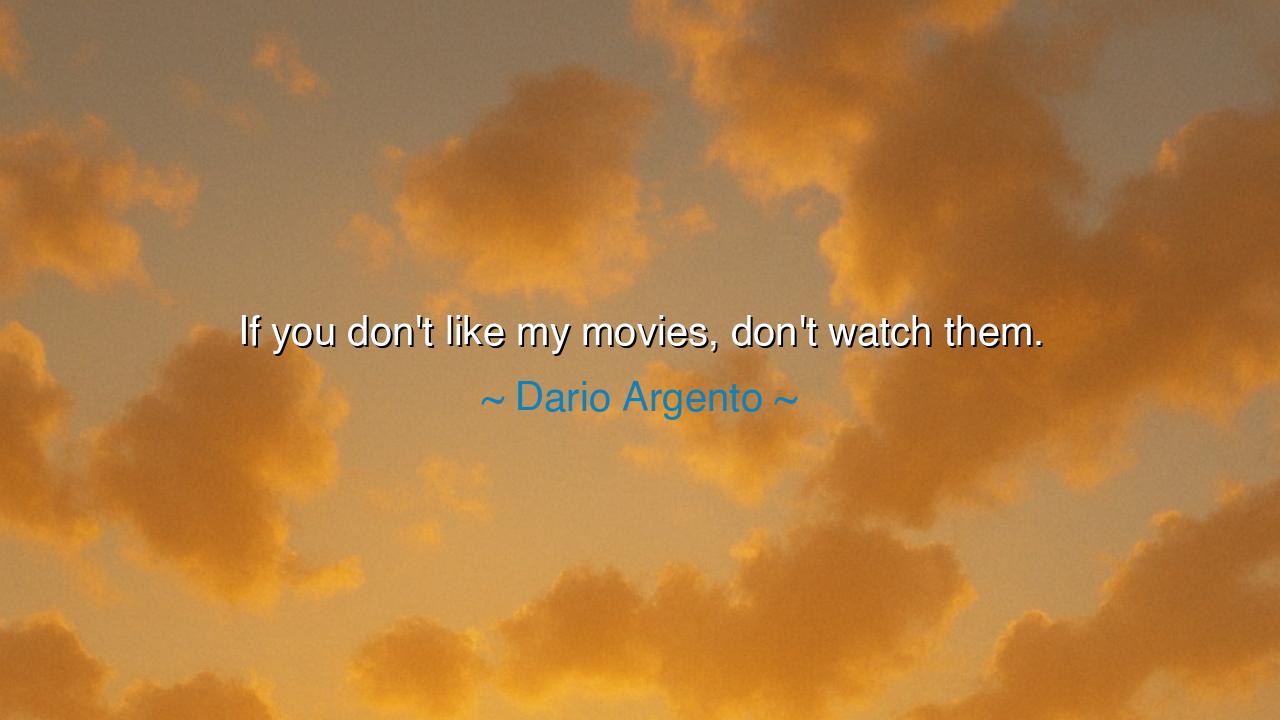
If you don't like my movies, don't watch them.






Listen, O children of the future, to the words of Dario Argento, a creator whose vision and craft have long stirred both admiration and controversy: "If you don't like my movies, don't watch them." These words carry a deep and unflinching truth about the nature of art and the artist's responsibility. Argento, a master of the horror genre, makes clear that the artist is not beholden to the whims of critics or audiences, but instead is dedicated to creating the work that is true to their own vision. Art, in this sense, is not for the pleasure of all, but for the expression of the artist's inner world. If it resonates, it resonates; if it does not, then that is a choice the viewer can make—there is no obligation to engage with something that does not speak to them.
In the ancient world, O children, artists and philosophers alike grappled with the idea of individual truth. Socrates, that great Greek sage, was often met with criticism for his relentless questioning of the status quo. His approach to truth was not one of universal acceptance, but one of deeply personal inquiry, where the journey to wisdom was a solitary endeavor. He did not seek to please the people, nor to cater to their desires for comfort, but instead, he pursued the truth that resided in his heart and mind. Like Socrates, Argento’s work is a reflection of his personal vision, not one to be diluted by the approval or disapproval of others. His art is not for the faint of heart, nor for those who seek only to be comforted, but for those willing to face the darker sides of the human psyche.
Consider, O children, the example of Michelangelo, the great Renaissance sculptor, who famously said, "I saw the angel in the marble and carved until I set him free." Michelangelo’s art was not created for the pleasure of his patrons, but was a personal vision he felt compelled to realize. The David, his masterpiece, was not a figure of common appeal—it was a representation of strength, humanity, and perfection that came from within, and it stood as a testament to his own beliefs about what art should represent. Similarly, Argento's films are not designed to cater to conventional tastes or expectations. They are born of his own deep engagement with the darker aspects of existence, unafraid to confront horror in its rawest form.
Argento’s boldness in making films that challenge the boundaries of genre and storytelling reminds us of the ancient warriors who chose their own path, regardless of the opposition they faced. Alexander the Great, though beloved by many, faced constant criticism from those who did not understand his vision or his relentless pursuit of empire. Yet, like Argento, Alexander knew that his destiny was not for the faint-hearted. He moved forward with a singular purpose, guided by his vision and his belief that he must follow his own path, even when it led him into the unknown or the misunderstood.
In Argento’s work, O children, there is an inherent freedom that every artist must claim. The artist is not a servant to the whims of popularity or the fleeting tastes of the masses. Art is the expression of a deeper truth that is often uncomfortable, challenging, or even disturbing. Just as the ancient poets like Homer wrote their epic tales not to please every listener, but to capture the vast scope of human experience, so too does Argento create his horror films not to make everyone happy, but to express the darker, more primal aspects of the human condition. To be true to oneself as an artist is to be unafraid of criticism, for creation comes from the deep well of the artist’s truth, not from the desire for external approval.
The lesson, O children, is clear: in your own lives, be true to your vision, your purpose, and your calling. Do not allow the expectations of others to dilute the expression of your soul. Whether you are an artist, a teacher, a leader, or a simple craftsman, the work you produce must come from a place of authenticity. Do not shy away from the criticism of those who cannot understand your vision. As Argento says, if they do not like your work, they need not engage with it. There will always be those who will not understand, but that is no reason to abandon your truth. Embrace the courage to follow your own path, just as the great artists and thinkers of the past did.
In your own journey, O children, remember that the greatest works—whether in art, philosophy, or life—are often those that do not conform, that do not bend to the expectations of others. Seek your own truth, express it with unapologetic honesty, and be willing to accept that not all will understand or appreciate it. This is the price of authenticity, but also the reward. As you move through the world, create and live in such a way that when others look upon you, they see not a reflection of what they expect, but a reflection of the deepest truth that resides within you. And as for the rest—if they do not understand, let them seek their truth elsewhere.






AAdministratorAdministrator
Welcome, honored guests. Please leave a comment, we will respond soon